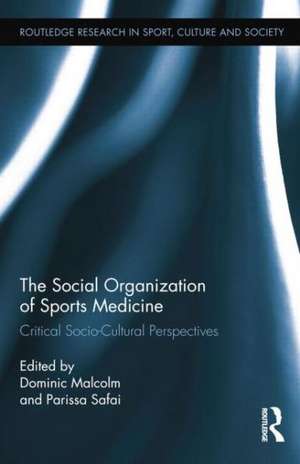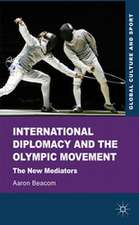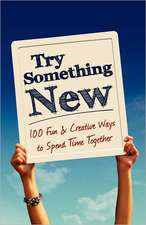The Social Organization of Sports Medicine: Critical Socio-Cultural Perspectives: Routledge Research in Sport, Culture and Society
Editat de Dominic Malcolm, Parissa Safaien Limba Engleză Paperback – 3 iul 2014
| Toate formatele și edițiile | Preț | Express |
|---|---|---|
| Paperback (1) | 491.21 lei 43-57 zile | |
| Taylor & Francis – 3 iul 2014 | 491.21 lei 43-57 zile | |
| Hardback (1) | 1066.79 lei 43-57 zile | |
| Taylor & Francis – 17 aug 2012 | 1066.79 lei 43-57 zile |
Din seria Routledge Research in Sport, Culture and Society
-
 Preț: 327.30 lei
Preț: 327.30 lei - 9%
 Preț: 1037.40 lei
Preț: 1037.40 lei - 8%
 Preț: 388.68 lei
Preț: 388.68 lei -
 Preț: 324.82 lei
Preț: 324.82 lei -
 Preț: 309.74 lei
Preț: 309.74 lei -
 Preț: 349.17 lei
Preț: 349.17 lei -
 Preț: 203.03 lei
Preț: 203.03 lei -
 Preț: 311.07 lei
Preț: 311.07 lei -
 Preț: 367.98 lei
Preț: 367.98 lei -
 Preț: 364.17 lei
Preț: 364.17 lei -
 Preț: 325.21 lei
Preț: 325.21 lei -
 Preț: 324.82 lei
Preț: 324.82 lei -
 Preț: 341.57 lei
Preț: 341.57 lei -
 Preț: 219.00 lei
Preț: 219.00 lei - 19%
 Preț: 270.67 lei
Preț: 270.67 lei - 18%
 Preț: 1060.52 lei
Preț: 1060.52 lei - 18%
 Preț: 1119.52 lei
Preț: 1119.52 lei - 18%
 Preț: 1059.48 lei
Preț: 1059.48 lei -
 Preț: 488.29 lei
Preț: 488.29 lei - 18%
 Preț: 1059.48 lei
Preț: 1059.48 lei - 18%
 Preț: 1110.74 lei
Preț: 1110.74 lei - 18%
 Preț: 1109.99 lei
Preț: 1109.99 lei - 18%
 Preț: 1059.14 lei
Preț: 1059.14 lei - 18%
 Preț: 1108.42 lei
Preț: 1108.42 lei - 18%
 Preț: 1120.20 lei
Preț: 1120.20 lei - 18%
 Preț: 1058.79 lei
Preț: 1058.79 lei - 18%
 Preț: 1064.36 lei
Preț: 1064.36 lei - 18%
 Preț: 1056.80 lei
Preț: 1056.80 lei -
 Preț: 486.38 lei
Preț: 486.38 lei - 18%
 Preț: 1050.78 lei
Preț: 1050.78 lei - 18%
 Preț: 1112.90 lei
Preț: 1112.90 lei - 18%
 Preț: 1112.34 lei
Preț: 1112.34 lei - 18%
 Preț: 1060.87 lei
Preț: 1060.87 lei - 28%
 Preț: 818.95 lei
Preț: 818.95 lei - 18%
 Preț: 1109.99 lei
Preț: 1109.99 lei - 18%
 Preț: 1112.17 lei
Preț: 1112.17 lei - 18%
 Preț: 1106.02 lei
Preț: 1106.02 lei - 18%
 Preț: 1058.79 lei
Preț: 1058.79 lei - 18%
 Preț: 1054.75 lei
Preț: 1054.75 lei - 18%
 Preț: 1057.09 lei
Preț: 1057.09 lei - 30%
 Preț: 845.30 lei
Preț: 845.30 lei - 18%
 Preț: 1061.06 lei
Preț: 1061.06 lei - 18%
 Preț: 1058.43 lei
Preț: 1058.43 lei
Preț: 491.21 lei
Nou
Puncte Express: 737
Preț estimativ în valută:
94.02€ • 102.16$ • 79.03£
94.02€ • 102.16$ • 79.03£
Carte tipărită la comandă
Livrare economică 21 aprilie-05 mai
Preluare comenzi: 021 569.72.76
Specificații
ISBN-13: 9781138809475
ISBN-10: 1138809470
Pagini: 358
Ilustrații: 3 black & white tables
Dimensiuni: 152 x 229 x 20 mm
Greutate: 0.5 kg
Ediția:1
Editura: Taylor & Francis
Colecția Routledge
Seria Routledge Research in Sport, Culture and Society
Locul publicării:Oxford, United Kingdom
ISBN-10: 1138809470
Pagini: 358
Ilustrații: 3 black & white tables
Dimensiuni: 152 x 229 x 20 mm
Greutate: 0.5 kg
Ediția:1
Editura: Taylor & Francis
Colecția Routledge
Seria Routledge Research in Sport, Culture and Society
Locul publicării:Oxford, United Kingdom
Public țintă
Postgraduate and UndergraduateCuprins
1. Introduction: The Social Science of Sports Medicine Dominic Malcolm and Parissa Safai Part I: Sports Medicine Conceived 2. The Role of Physiology and Cardiology in the Founding and Early Years of the American College of Sports Medicine Jack W. Berryman 3. From Voluntarism to Specialization: Sports Medicine and the British Association of Sport and Medicine Neil Carter 4. From Rehabilitation Patients to Rehabilitating Athletes: Searching for a History of Sports Medicine for Athletes with Disabilities Fred Mason Part II: Sports Medicine Organized 5. Women Professional Athletes’ Injury Care: The Case of Women’s Football Joseph A. Kotarba 6. Public Health, Elite Sport and "Risky Behaviours" at the Canada Winter Games Victoria Paraschak 7. The Benefits and Challenges of Complementary and Alternative Medicines for Health-Care in Sport Elizabeth C.J. Pike 8. Challenges to the Implementation of a Rationalized Model of Sports Medicine: An Analysis in the Canadian Context Nancy Theberge Part III: Sports Medicine Practices 9. Docile Bodies or Reflexive Users? On the Individualization of Medical Risk in Sports Lone Friis Thing 10. Sports Medicine, Client Control and the Limits of Professional Autonomy Ivan Waddington 11. Making Compromises in Sports Medicine: An Examination of the Health-Performance Nexus in British Olympic Sports Andrea Scott 12. Sports Physicians and Doping: Medical Ethics and Elite Performance John Hoberman Part IV: Sports and Medicine Contested 13. Doctors Without Degrees Michael Atkinson 14. Pre-Participation Screenings in Sports: A Review of Current Genetic/Non-Genetic Test Strategies Arno Müller 15. Sports Medicine Beyond Therapy: Genetic Doping and Enhancement Yoshitaka Kondo and Mike McNamee
Descriere
This volume charts changing perceptions of sport within medical discourse, attempts by sports medicine providers to forge professional identities in response to these processes, the day-to-day experiences of deliverers of sports medicine and the reactions of recipients of that healthcare.









